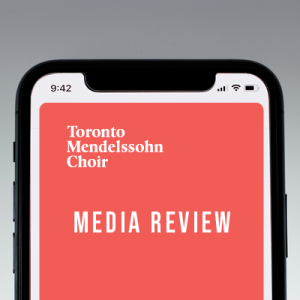Carol Toller, The Globe and Mail. Toronto’s Tafelmusik and Mendelssohn choirs and the buzzy New York-based experimental ensemble Roomful of Teeth have all commissioned pieces from Balfour, and close to 20 groups across the country have performed his first published work, Ambe. The five-minute piece builds around a driving, rhythmic bass line that echoes the sound of a ceremonial drum – or, as Balfour has said, the heartbeat of Mother Earth – and projects a message of unity for all "two-legged beings.” The text is in Ojibway, and its energetic, welcoming message “seems to be something that people want to hear right now,” Balfour says.It’s a far cry from Handel’s “Hallelujah” chorus and the rest of the Western canon that dominates choral programming in North America. And for Canadian choir directors, that may be what’s most exciting about Balfour’s work. He’s drawing on his First Nations identity to nudge the Canadian classical-music scene out of its stodgy Eurocentric traditions.
Author: tmchoir
A great blend of architecture and music
Michael Johnson, Concertonet.com. This year’s Easter presentation by the Toronto Mendelssohn Choir (“Sacred Music in a Sacred Space“) took place at St. Anne’s Anglican Church a heritage building whose interior was decorated in the 1920s by notable artists in a style hearkening back to art nouveau. The space thus related nicely with the program of 20th century music composed between 1910 and 1987, a time period that experienced the emergence of various musical philosophies and styles. The word “rapt“ best describes the approach of all eight composers.
Toronto Mendelssohn Choir celebrates singing through three centuries with a gala concert to launch its 2019/20 season
The TMC celebrates its 125th anniversary in 2019 with a gala concert with the Toronto Symphony Orchestra at Koerner Hall. The Choir was founded in 1894 by conductor Augustus Vogt and had its first concert on January 15, 1895 in Massey Hall. The Choir has performed in the 19th, 20th and 21st centuries, as Toronto went from a city of 200,000 to the Greater Toronto Area of over 6 million. A lot has changed over the years, but the Choir continues to hold annual auditions for all choir members, a practice started by founder Augustus Vogt.The Gala Concert will take place Sunday, October 20, 2019 at 3:30 pm at Koerner Hall. The Choir will be joined by the Toronto Symphony Orchestra, long-time musical partners with the TMC and a youngster at only 97 years old. TMC Conductor David Fallis has put together a program that brings together the three centuries in three major works: Gabriel Fauré’s Requiem, composed in the late 1880s and re-orchestrated by him in 1894, the year of the founding of the TMC; Igor Stravinsky’s Symphony of Psalms, composed in 1930 and one of the greatest choral-orchestral works of the 20th century; and for the 21st century a new commission by acclaimed Cree composer Andrew Balfour. Andrew’s commission for the TMC will set one of the Biblical psalms in Cree, interwoven with words by Indigenous poet Karen Vermette.
Toronto Mendelssohn Choir inspired by new venue for Sacred Music in a Sacred Space
David Richards, Toronto Concert Reviews. The Toronto Mendelssohn Choir found a new venue for its annual concerts for Holy Week,Sacred Music for a Sacred Space. The new location, St. Anne’s Anglican Church, has a beautiful Byzantine style structure that dates to 1907 with interior decoration and paintings completed by J.E.H MacDonald and other members of the Group of Seven. Before the concert began many of the early birds in the audience were out of their seats getting closer looks and photos of the iconography on the walls and ceilings The symmetrical shape and the domed ceilings gave a warm acoustic without the excessive decay of Gothic styled churches. The setting was clearly one of Interim Conductor and Artistic Advisor David Fallis’s inspirations for the program.The first half of the program was clearly designed to set the tone for a meditative experience. Two reflective motets by French composers opened the concert.
David Fallis leads Toronto Mendelssohn Choir in a program of 20th century a cappella works for Sacred Music for a Sacred Space – April 17 and Good Friday, April 19
TMC’s popular annual Sacred Music concerts are intended to provide a moment of calm for patrons with a program of contemplative a cappella music. For 2019, David Fallis has created a program of 20th century composers with the first half featuring composers from France and Switzerland, while the second half features composers from Eastern Europe and Russia.David opens the concert with Olivier Messaien’s O sacrum convivium – a composition to help patrons step out of time. In his program notes, David remarks that this motet is “a perfect example of Messiaen’s preoccupation with the suspension of the perception of time in music by the use of extremely slow tempos and subtle changes in length of notes, all designed to bring us closer to something outside of time, eternal.” The first half also includes Poulenc’s Salve Regina and Martin’s Mass for Double Choir, all performed by the 70-member Mendelssohn Singers.The second half of music of the Eastern Orthodox Church will be sung by the full TMC.
Sacred Music for a Sacred Space 2019 Program Notes
Welcome to Sacred Music for a Sacred Space. All of the works on tonight’s program come from the 20th century, the first half from France and Switzerland, the second half from eastern Europe and Russia, with the exception of Healey Willan’s masterpiece which concludes the evening.In earlier periods of European musical history, sacred music was often written by composers who essentially earned their living from the church, and one cannot really know how much the composer was writing from a position of deeply held faith, or writing what was required, often brilliantly, much as an opera composer has to be able to create music which is suitable to many situations or characters. As the influence of the church as employer diminished in the late Baroque and Classical periods, less sacred music was written, and the 19th century sees much more emphasis on symphony, opera and chamber music than on sacred music. There are not many Romantic composers whose chief claim to renown is their sacred music, and it is not by chance that the greatest works of 19th century sacred music are Requiems (Verdi, Berlioz, Brahms), in which one muses on death, a human condition not restricted to people of faith.So by the 20th century it is a decided choice for a composer to write sacred music, and many of the composers represented tonight write from a position of faith, if not always entirely orthodox.
Toronto Mendelssohn Choir’s Haydn and Handel celebration lifts the spirits on a blustery winter night!
Dave Richards, Toronto Concert Reviews. It was a miserable night to trudge downtown. The six or more inches of snow and slush were enough to discourage many from heading out. By mid-afternoon in Oakville when I learned that the GO trains would be cancelled for several hours, my own attendance was put in doubt. But for those of us who did brave the weather to St. Andrew’s Church, The Toronto Mendelssohn Choir and their Interim Conductor and Artistic Director David Fallis made it more than worth our effort with a celebration of Haydn and Handel.
Conductor David Fallis to lead Toronto Mendelssohn Choir, orchestra and stellar soloists in Haydn’s Missa in tempore belli and Handel’s Coronation Anthems
Conductor David Fallis has put together a stellar group of soloists for this concert of two beloved 18th century greats on February 27, 2019. The Choir and orchestra will be joined by soprano Mireille Asselin, mezzo-soprano Christina Stelmacovich, tenor Asitha Tennekoon, and bass-baritone Stephen Hegedus.
Of the Missa in tempore belli, David writes in the program notes:
“The mass has many extraordinary touches. The overall feel is optimistic and confident, appropriate to the basic key of C major, but the beautiful cello and bass singer duet at the Qui tollis in the “Gloria”, the deeply moving Et incarnatus est in the “Credo” and the gorgeous harmonic colouring at so many moments mark this mass as the work of a great composer working at the height of his powers.”
Program Notes: Handel and Haydn, February 2019
Haydn's Missa in tempore belli (Mass in time of war) is so called because it was written in 1796-97 as Napoleon’s forces were advancing towards Vienna. In German-speaking countries it is often referred to as the Paukenmesse (Timpani Mass): the timpani does play a significant part in the mass, especially in the Agnus Dei where Haydn uses a brilliant drum solo to heighten the intensity of the movement’s prayer for mercy and peace.
The mass has many extraordinary touches. The overall feel is optimistic and confident, appropriate to the basic key of C major, but the beautiful cello and bass singer duet at the Qui tollis in the “Gloria”, the deeply moving Et incarnatus est in the “Credo” and the gorgeous harmonic colouring at so many moments mark this mass as the work of a great composer working at the height of his powers.




